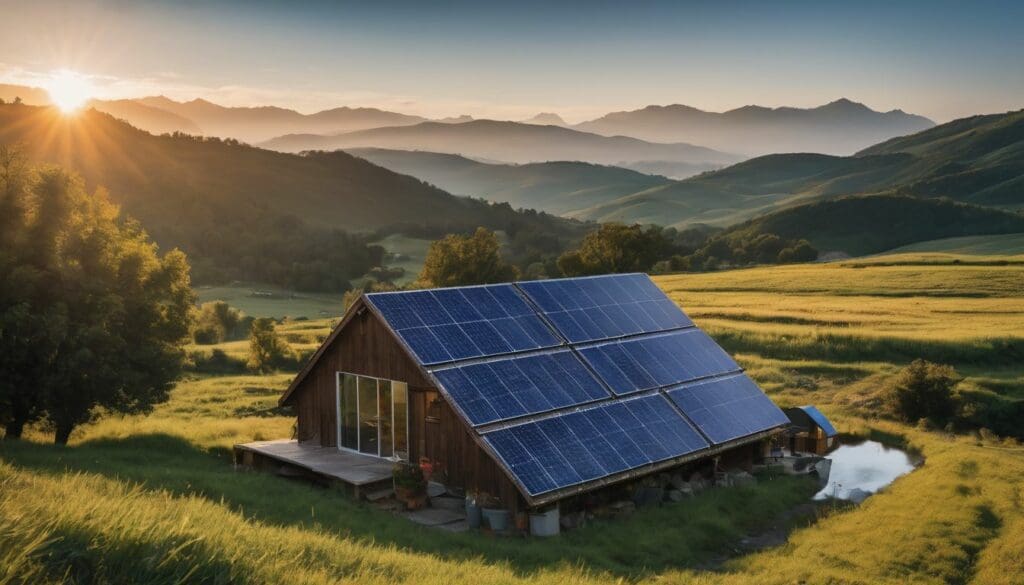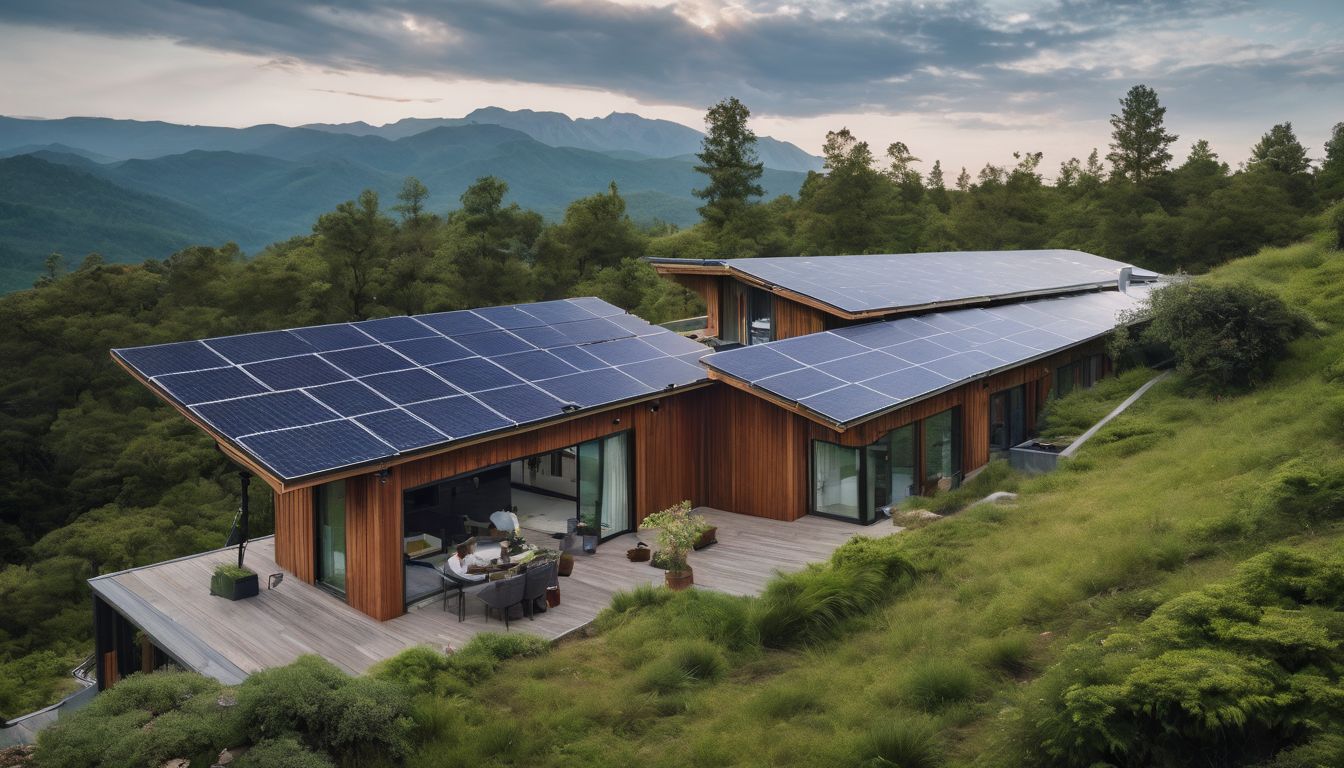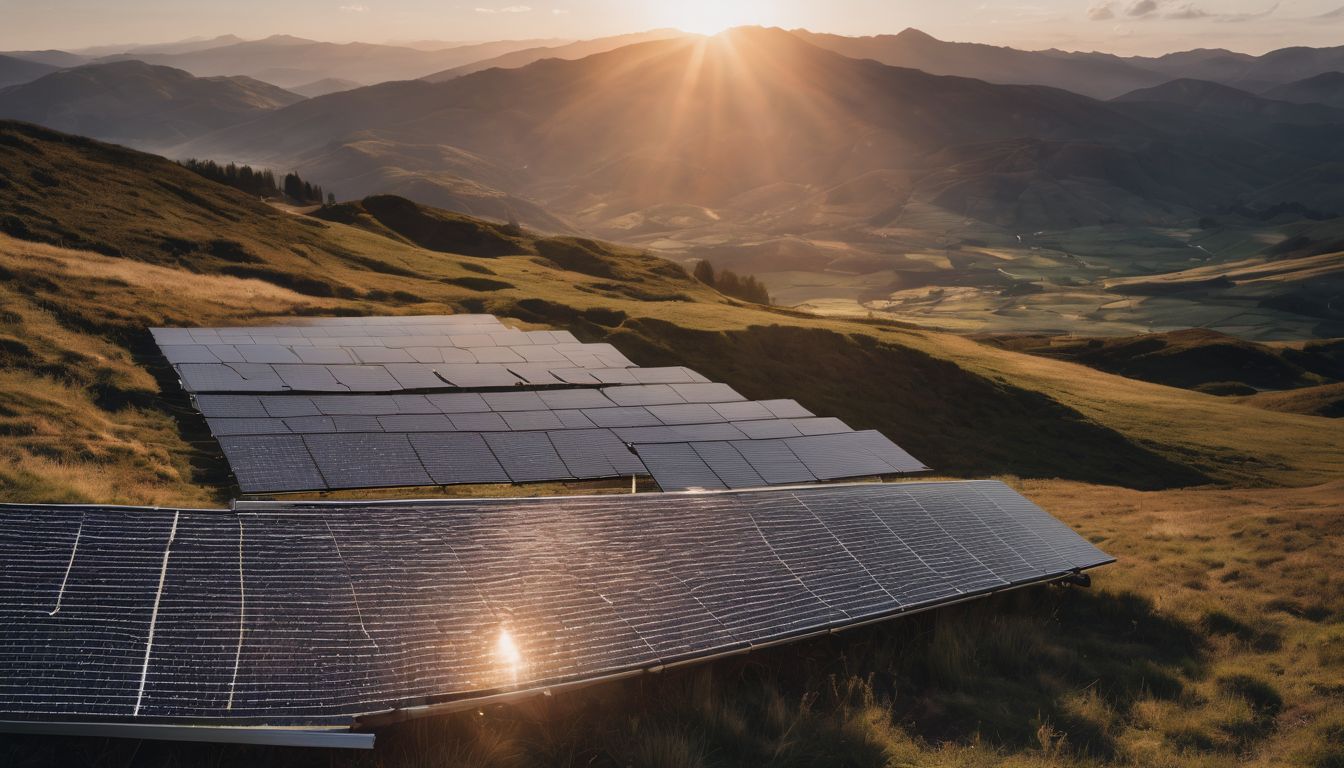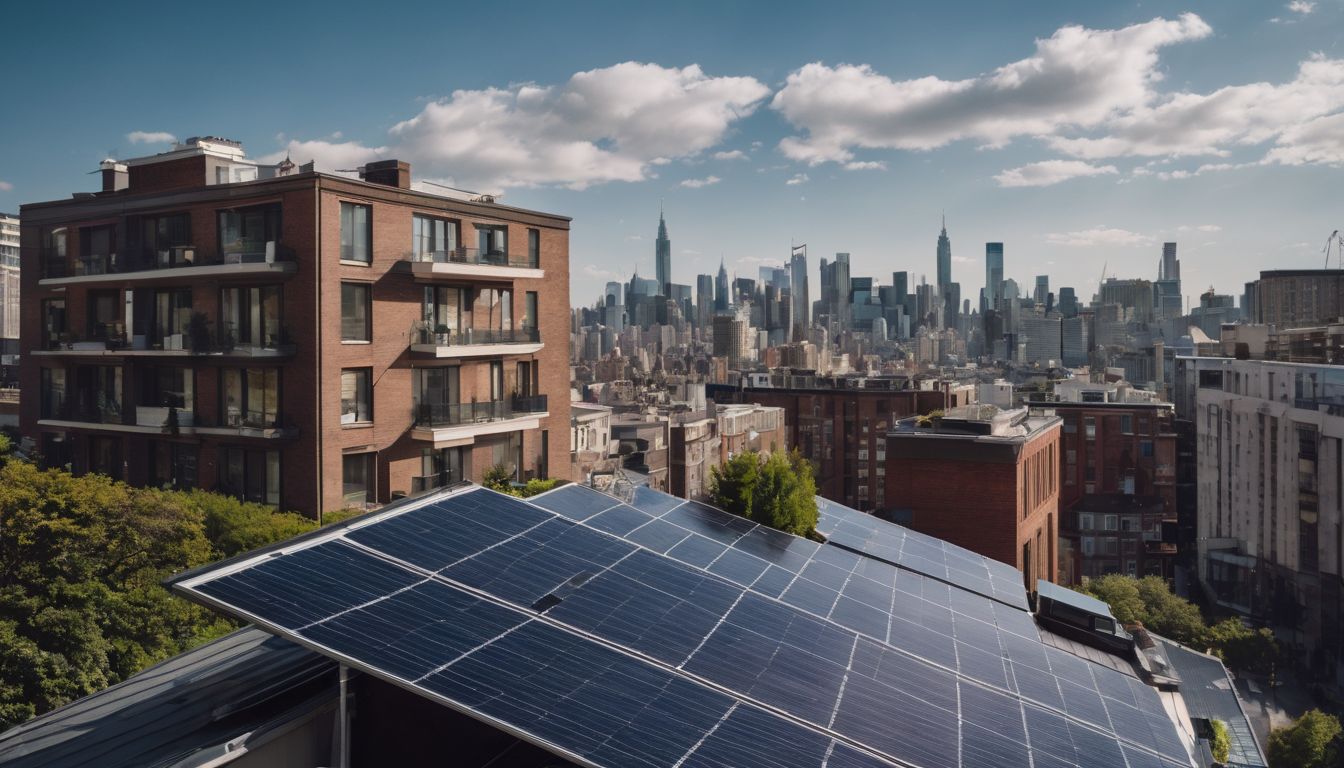Frustrated by rising energy bills and power outages? Off-grid solar systems offer a beam of hope, providing reliable power without relying on traditional energy grids. This article delves into the advantages and challenges of choosing an independent solar setup, guiding you to make an informed decision about your energy future.
Discover if off-grid living lights up your life!
Key Takeaways
- Off – grid solar systems provide energy independence and consistent power supply without reliance on traditional electricity grids, making them particularly useful during blackouts.
- Although off – grid systems can lead to significant monthly savings on utility bills, they require a higher initial investment due to the need for batteries, backup generators, and other components.
- The capacity of battery storage in off – grid setups is limited; therefore, managing energy efficiently and potentially using additional power sources are important considerations.
- These systems demand more active management including regular maintenance, careful planning for energy consumption needs, and understanding efficiency requirements for appliances and electronics used in the household.
- Before switching to an off-grid solar system, it’s essential to consider factors such as location suitability for sunlight exposure, initial costs versus long-term benefits, local regulations regarding installations, ongoing maintenance commitments, and your ability to manage limited energy resources.
Understanding Off-Grid Solar Systems
An off-grid solar system is a standalone power generation and storage system that operates independently of the main electricity grid. It consists of solar panels, batteries, charge controllers, inverters, and sometimes backup generators.
Compared to grid-tied solar systems, off-grid systems are not connected to the utility grid and require energy storage for nighttime or cloudy days.
Components of an off-grid solar system
Understanding the parts that make up an off-grid solar system is key to appreciating its capabilities and limitations. Each component plays a crucial role in harnessing and distributing renewable energy effectively.
Comparison to grid-tied solar systems
Having discussed the components of an off-grid solar system, let’s now examine how these systems stack up against grid-tied alternatives.
table {
width: 100%;
border-collapse: collapse;
}
table, th, td {
border: 1px solid black;
}
th, td {
padding: 10px;
text-align: left;
}
th {
background-color: #f2f2f2;
}
| Aspect | Off-Grid Solar Systems | Grid-Tied Solar Systems |
|---|---|---|
| Power Supply | Energy supply is self-contained | Relies on the main electricity grid |
| Initial Cost | Higher due to batteries and backup systems | Generally lower, fewer components required |
| Blackouts | Not impacted by grid blackouts | Power outages affect service unless equipped with a battery backup |
| Energy Independence | Complete independence from external energy providers | Partial dependency; can sell excess power back to the grid |
| Energy Storage | Must have adequate storage for energy needs | Excess energy is fed into the grid |
| Monthly Savings | Savings achieved by not purchasing energy from the grid | Savings through net metering and reduced utility bills |
| Maintenance | Requires more active management and maintenance | Less maintenance, mostly managed by utility company |
| Location Suitability | Ideal for remote locations without grid access | Best for areas with reliable grid access |
Now that we’ve contrasted the two solar systems, we can delve deeper into the advantages of adopting an off-grid approach.
Pros of Off-Grid Solar Systems
– Independence from energy providers means no more reliance on traditional electricity sources.
– Monthly savings on utility bills due to the use of free, renewable solar energy.
Independence from energy providers
Off-grid solar systems offer energy independence. By generating your power, you are not reliant on energy providers. This freedom from traditional electricity sources gives you control over your energy usage and costs, reducing dependence on non-renewable resources while contributing to a more sustainable environment.
Choosing an off-grid solar system aligns with the values of environmentally conscious individuals who seek to reduce their carbon footprint and embrace green energy solutions. This shift towards self-sufficiency empowers you to live sustainably and independently, making a positive impact on the planet while enjoying reliable access to renewable energy.
Monthly savings
When you’re off-grid, your electricity bills become a thing of the past. Utilising solar energy means you can take control of your monthly expenses and enjoy significant savings in the long run.
This sustainable approach to power generation helps reduce reliance on external energy providers and ensures that your hard-earned money stays in your pocket – all while contributing to a greener planet.
Relying on off-grid solar systems can result in substantial monthly savings due to reduced utility costs and greater independence from traditional energy sources.
No blackouts
Off-grid solar systems ensure a consistent power supply, even during electrical blackouts. This means uninterrupted energy for your household in case of emergencies or grid failures.
With reliable power available at all times, off-grid solar systems provide peace of mind and security, especially in remote or rural areas where electricity outages are more common.
These independent solar systems are equipped with battery storage that stores excess energy generated during sunny periods, ensuring continuous power availability when sunlight is scarce or absent.
Cons of Off-Grid Solar Systems
Higher initial cost and limited energy storage can be significant drawbacks of off-grid solar systems, with the added need for careful management of energy efficiency requirements.
Higher initial cost
Off-grid solar systems come with a higher initial cost compared to grid-tied systems. The expense includes the purchase of solar panels, batteries for energy storage, and inverters for converting DC power to AC.
However, this investment offers long-term savings on electricity bills and provides independence from traditional utility companies.
When considering off-grid living, it’s important to weigh the initial cost against potential long-term benefits in terms of monthly savings and environmental impact. It’s essential to ensure that the system is designed efficiently based on energy consumption requirements.
Limited energy storage
Off-grid solar systems have limited energy storage capacity, meaning that excess energy cannot be stored for later use during periods of low sunlight. This limitation requires careful consideration of energy usage and may necessitate additional backup power sources to ensure a continuous supply of electricity.
Adequate planning and efficient energy management are essential to optimise the benefits of off-grid solar systems.
When considering off-grid living, it’s important to evaluate the available energy storage options and their compatibility with your specific needs. Implementing strategies for maximising energy efficiency can help mitigate the challenge of limited storage capacity, ensuring sustainable and reliable access to renewable solar power.
Energy efficiency requirements
Meeting energy efficiency requirements is crucial for off-grid solar systems. Proper planning and equipment selection maximise the system’s performance, ensuring that every watt of energy generated is used efficiently.
This involves choosing high-quality appliances and lighting, as well as implementing conservation measures to minimise energy consumption.
Ensuring that your off-grid solar system meets energy efficiency requirements not only reduces your environmental impact but also maximises the benefits of renewable energy. By prioritising efficient energy use, you can make the most of your sustainable power source and contribute to a more environmentally friendly lifestyle.
Is Off-Grid Solar Right for You?
Evaluate your energy needs, location, and budget to determine if off-grid solar is the right choice for you. Read on to learn more about the potential benefits and drawbacks of this sustainable energy solution.
Weighing the pros and cons
Weighing the pros and cons of off-grid solar systems is crucial for anyone considering this sustainable energy option. Here are the key points to consider:
- Independence from energy providers means freedom from rising electricity costs and reliance on non – renewable sources.
- Monthly savings result from reduced or eliminated utility bills, providing long – term financial benefits.
- No blackouts ensure continuous power supply, even during grid failures or extreme weather events.
- Higher initial cost demands substantial investment upfront, although it promises long – term savings and environmental benefits.
- Limited energy storage may require additional backup options during extended periods of low sunlight or high energy usage.
- Energy efficiency requirements entail careful management to match energy consumption with available solar power.
Considerations for installation
- Solar panel placement: Ensure optimal sunlight exposure.
- Battery storage location: Choose a secure, well-ventilated area.
- Energy usage assessment: Understand your energy needs to determine the number of panels required.
- Maintenance requirements: Consider the upkeep needed for off-grid systems.
- Backup generator: Decide if this is necessary for prolonged periods without sunshine.
- Local regulations and permits: Familiarise yourself with any restrictions or permissions needed.
Conclusion
In conclusion, off-grid solar systems offer independence from energy providers. Monthly savings are a benefit of off-grid solar systems. It’s important to weigh the pros and cons before deciding if an off-grid solar system is right for you.
Considerations for installation should be taken into account when considering an off-grid solar system.
FAQs
1. What are the benefits of off-grid solar systems?
Off-grid solar systems provide sustainable energy, allowing you to live independently without relying on grid-tied electricity and reducing the risk of blackouts from the main grid.
2. Are there any challenges with using off-grid solar panels?
The initial investment for offgrid solar power can be high, and managing your own isolated solar system requires careful planning to ensure consistent electricity availability.
3. Can I use an off-grid solar system in remote areas?
Yes, remote solar power is ideal for locations where connecting to a gridtied system is not feasible; it offers renewable energy solutions tailored for offgrid living.
4. How do I know if an off-grid or a grid-tied system is better for me?
If you value sustainability and independence from public utilities, then living offgrid with a personal supply of solar electricity may suit you better than being tied to the electrical grid.
5. Does going off the grid with solar technology help the environment?
Certainly! Offgrid renewable energy sources like these reduce reliance on fossil fuels which helps protect our planet’s natural resources.





